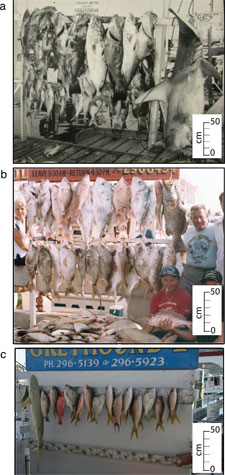This week's seminar at the Smithsonian Tupper Center in Panama City was presented by Dr. Loren McClenachan from Colby College in Maine on the use of historical ecology in marine conservation.
| I found the talk particularly interesting because of the use of unconventional, cultural data - such as collecting information about the size of fish from historic photographs of fisherman and their daily catch from the early 1900s and the food available on restaurant menus in Hawaii, where most seafood would be locally caught. This method of data collection provides a fascinating insight into the effects of overfishing by humans on the size and biodiversity of the fish in our oceans. As you can see in the picture to the left (from one of Dr. McClenachan's talks), the size of the "prize catch of the day" has decreased significantly over time. Dr. McClenachan continued on to discuss the importance of all historical data for assessment of species conservation methods. If you just look at the short conservation history of an animal, such as sea turtles, a population increase can look extremely significant and perhaps result in the decrease of conservation methods. However, if you look at long term data, such as that gathered from this project, these small population increases can be dwarfed by the multi-decade decreases as a result of human development. Definitely a very interesting talk! --- Patrick |

